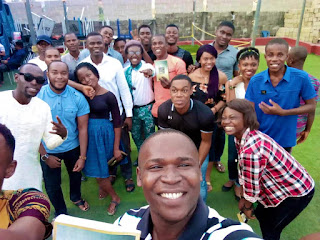In the time of a pandemic, a writer needs some break to recreate as well as some space to keep their candles on. There has been events and programs heading online at this time; and NGIGA book club is one of them.
NGIGA Book Club is hosting book discussions via their WhatsApp group.
The book club is a long queue of young writers from South-Eastern Nigeria who are already revamping the outlook of the literary industry for that region. They are based in Owerri, Imo state. Therefore, their major target is also to put the state, famine of a literary aura, into Nigeria’s literary map.
They are doing this by creating spaces where book conversations are housed, supporting home grown literary brands and promoting their own writers.
In the evening of Saturday, 4th April, 2020- between 9:00pm to 10:00pm, a group of up to 70 participants and 5 curators stormed the group to discuss a book they have read in the past 2 days: ON BLACK SISTER’S STREET BY CHIKA UNIGWE
In a ceremony of WhatsApp notifications that came at each second, their main areas of discussion were writing style and language :
Darlington Anuonye wrote:
Unigwe is a sensitive writer, who partakes in the consciousness of her characters, drawing from their environment peculiar cultural and socio-linguistic elements that enrich literature.
As a Nigerian living in the diaspora, what Unigwe lacks in experience (the peculiar Nigerian life) she complements with the limitless scope of the imagination.
Unigwe’s style of writing, on a closer look, is simple but lofty. The amount of research that goes into On Black Sisters’ Street is prodigious, and we see this in the complexity of the characters’ life, in their differences, and in their similarities.
Vivian Brown:
About Chika Unigwe’s style of writing, I like the fact that her words are more of Nigerian based. The fact that she is a Nigerian living in Belgium didn’t affect her writing sensibility in the novel. Her usage of pidgin English brings home the essence of her language usage.
Kelechi Nwanguma:
Unigwe’s diction is obviously “Nigerian”. I agree with Seun Lari Williams that a Nigerian can use more than “three hundred intonations”, when making a speech. Unigwe reaffirms this in On Black Sisters’ Street, a masterpiece of African literature.
Ebube Ugorji:
Unigwe narrates Sisi’s death with an almost dispassionate voice bereft of pity. Sisi dies…as if death was something causal … like window-shopping.
How does Unigwe maintain the interest of the readers thereafter? Does she really do away with suspense?
Kelechi Nwanguma:
In my opinion, she doesn’t use the idea of Antonio Gaudism, she knows the condiments required for her dish, so she sets about it with aplomb and precision.
However, it is a critical focus on the Nigerian type of storytelling.
Darlington Anuonye:
Unigwe, to my thinking, is an immensely gifted writer.
I have pointed out her understanding of symbolism in art, and I’d like to extend my opinion by stating that Unigwe begins the end of her story right from the beginning. In the second page of the novel, we are invited to “imagine a room without a door”. Here, Unigwe subtly introduces us into the life and future of Sisi (recall that the room in question belongs to Sisi’s boyfriend in Lagos).
As I see it, Sisi and her fellow sex workers are rooms without doors. They survive by opening the doors of their legs for different men to walk in and out freely. Unigwe’s reference to Brian Chikwava’s Seventh Street Alchemy “Armed with a vigina and a will to survive, she knows that destitution will never lay claims to her again” clarifies my understanding.
Question:
Something striking about Unigwe’s work. Having read Night Dancers, I think death is important in her work. It is symbolic. It is sacrificial in a sense, a necessity to release or enable persons come to a realization.
In Unigwe’s on Black Sister’s Street, what really does Sisi’s death accomplish?
Ifesinachi Nwadike:
Same reason Okonkwo died.
Same reason Ezeulu went mad.
Same reason Obi Okonkwo went to jail in No Longer at Ease.
Same reason Adichie killed Brother Eugene.
Same reason Kainene went missing till date.
I can go on and on to elaborate on the importance of death of an eclectic character.
It leaves the reader with the full understanding that life is one absurd theater that shocks your choices beyond just suspending your disbelief to read a story.
Conclusion
Darlington:
Chika is just a storyteller and we, her audience, must not be so carried away that we begin to ask about “Chika’s aim”, other than recognizing the familiarity between us and the characters, between our society and the characters society.
On Black Sisters’ Street is a realist novel. Is it moralistic? Not obvious. Is it condescending of prostitution? I don’t think so. Then what is Chika’s intention?
You see, we’re back to the question.
Chika’s intention, I think, is very similar to the intentions of all artists: to tell a simple story, with the hope that human beings somewhere will identify with it.
What other intention does Chika have? Perhaps to confront the myth that the vagina is a woman’s only means of survival. This, to my thinking, is not a case against prostitution, but against untruth.




